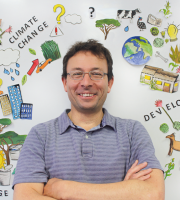AXA Chairs
South Africa
Understanding, Reducing and Managing African Climate Risk
Attributable change in climate risk
Drought is a pressing issue in southern Africa—one need only think back to Cape Town’s 2018 water crisis to be reminded of the stakes. A major focus of Prof. New’s work has been defining the contribution of human activity to such damaging events in southern Africa, and how that “attributable change” in climate then affects water security. Prof. New compared the simulated drought severity with and without human influence on climate and observed how the attributable change in climate risk propagates through to impacts on the ground.
Taking the Cape Town droughts as a case study, Prof. New showed that a three-fold attributable increase in the likelihood of the rainfall drought translated into a four-fold increase in risk of hydrological drought, which is the change in river flows. While it takes some time for theory to trickle down into practice, these findings could inform the design of more resilient water resource systems.
In related modeling work, Prof. New’s team found that the removal of the alien vegetation that siphons water from precious mountain catchments would help ease drought but would not totally offset the water security risk—already, the impact of climate change is too large for this to be a comprehensive adaptation measure.
Sovereign drought insurance
Drought’s dire consequences for food security are especially felt by vulnerable populations and will be compounded by a growing population and more frequent climate events. Working with the African Risk Capacity, Prof. New has applied his attribution methodology to their risk model of food insecurity. According to this work, climate change has increased the underwriting costs of insurance—in Zimbabwe and Malawi, the insurance cost has increased by nearly 50% compared to a world with no climate change. The use of historical data to drive these insurance risk models is also suboptimal, and existing methods need to be updated to more faithfully gauge the risks that insurers are insuring against.
Partnerships to support change
Furthering climate change research in Africa requires trust and collaboration. Prof. New has managed to incorporate some of his climate change attribution work into the African chapter of the Principles for Sustainable Insurance, a collection of insurance issuers. The climate attribution work has also been included in the 2022 Intergovernmental Panel on Climate Change Report. The ACDI has contributed more to the IPCC than any lab worldwide. Creating research capability in Africa through initiatives like an AXA Chair, says Prof. New, has strengthened the African voice in these international processes.
Another development during Prof. New’s 5-year Chair has been the creation of the ARUA Centre of Excellence in Climate and Development, which is an alliance between the Universities of Cape Town, Nairobi, and Ghana. As well as being a staunch supporter of research agendas that make sense for southern Africa, Prof. New has nurtured the development of MSc and Ph.D. students and mid-career researchers—the future experts in African climate risk.
Moving forward, together
The ACDI adopts a transdisciplinary approach, where societal actors, such as resilience managers in the city of Cape Town or the local Department of Water Affairs, are consulted on an ongoing basis. In this way, Prof. New hopes to transform awareness into action. However, there are challenges yet to overcome—many African countries have scarce or non-existent climate observation networks and find it difficult to update systems given the inadequacy of resources.
Prof. New hopes to probe the issue of climate-health relationships in Africa with Professor Lara Dugas, a new AXA Research Chair in Health at UCT. They will investigate whether climate change signals can be detected within longitudinal human health data, as well as the effects of climate on nutritional status and the implications for food security management. Prof. New hopes that the future Chairs will move from risk diagnosis to risk responses, such as finding solutions to the ever-present food security concern.
October 2022
Quantifying and Understanding the Changing Risk of Climate on Water and Food Security in Southern Africa
Interview
Read

Mark
NEW
Institution
University of Cape Town
Country
South Africa
Nationality
South African